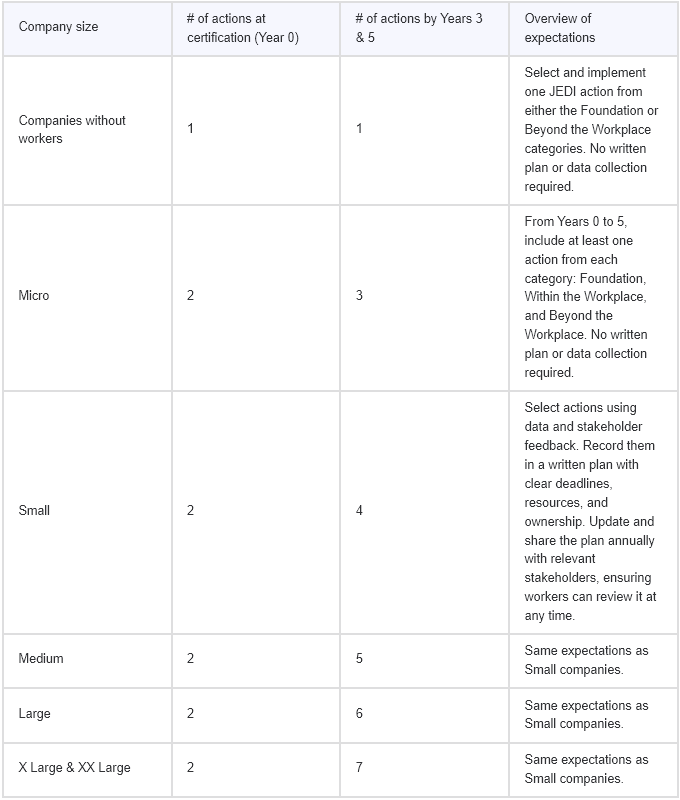The Justice, Equity, Diversity, & Inclusion (JEDI) Standards, Simplified
November 13, 2025
Every business participates in shaping the social fabric, whether or not it intends to. B Lab’s new Justice, Equity, Diversity, & Inclusion (JEDI) Standards make that influence deliberate. They challenge B Corps to turn good intentions into structure—measurable commitments to repair inequities, elevate underrepresented voices, and foster belonging across their operations and value chains. Through data, feedback, and transparent action, these standards chart a path toward workplaces grounded in justice, dignity, and fairness.
That mission feels more urgent than ever. In 2025, mentions of diversity, equity, and inclusion in S&P 500 filings fell by 68% year-over-year, and more than 200 companies scrubbed those terms entirely from their annual reports. Among Fortune 100 firms, public use of DEI language dropped 72%. At the same time, U.S. corporations have cut over 2,600 DEI-related roles since 2023: a 13% workforce decline tied to a broader retreat following President Trump’s Executive Order 14173, which narrowed DEI mandates in federal contracting and procurement.
Against that backdrop, the JEDI Standards offer a different path forward: one grounded in accountability, inclusion, and the understanding that equity is inseparable from business integrity. JEDI isn’t a “nice to have”; it’s both a defense of principle and a competitive advantage in a landscape of faltering corporate ethics.
These standards don’t treat inclusion as optional or symbolic. They call for systems repair by aligning business practices with universal human rights, equity, and belonging. JEDI applies across your organization, its value chain, and the communities you touch. While expectations increase with company size and complexity, every company can—and should—step forward.
Note: This overview is a simplified introduction. Specific requirements vary primarily by company size. For complete criteria, visit B Lab’s Standards page.
Overview: The Two Core JEDI Requirements
At the heart of the JEDI Standards are two core requirements that guide how companies operationalize their values. Together, they form a simple but powerful progression: first, understand your workforce and stakeholder landscape; then, act on what you learn.
JEDI1: Collect Data to Inform JEDI Actions
Companies begin by gathering data and feedback on diversity and inclusion across their workforce. This includes voluntary demographic data, facilitated discussions, and analysis of how experiences differ among identity groups. The goal is to establish a clear, evidence-based picture of the company’s current state, so that future actions are informed by real insights rather than assumptions.
JEDI2: Choose and Implement JEDI Actions
Once that baseline is established, companies convert awareness into accountability. JEDI2 requires businesses to select, plan, and implement measurable initiatives that strengthen justice, equity, diversity, and inclusion across their operations and value chains. These actions range from foundational commitments such as leadership training or policy review, to structural improvements in hiring, accessibility, product design, and supplier diversity.
Requirements scale by company size. Smaller businesses start with discussions, surveys, and a few targeted actions; larger companies are expected to collect more granular data, formalize a plan, and regularly inform stakeholders—especially workers—of their progress. The following sections introduce each requirement: what it means, why it matters, and how to begin putting it into practice.
JEDI1: Collect Data to Inform Action
To make meaningful progress on justice, equity, diversity, and inclusion, companies first need a clear picture of where they stand. JEDI1 focuses on that first step: gathering information about who’s in your workforce and how people experience work differently across identity groups. The goal is to replace assumptions with evidence that can guide smarter, more equitable decisions.
What’s required:
- For companies with 10–49 workers (Year 0): Facilitate at least one discussion or survey on JEDI principles each year
- For companies with 50+ workers (Year 0): Collect gender-identity or sex-at-birth data for at least five worker-related metrics (e.g., hiring, pay, promotions, or turnover) and disaggregate it internally
- For Large to XXL companies (Year 3 and 5): Add one additional social identity (e.g., race, ethnicity, or disability) chosen through stakeholder feedback. Continue collecting and reporting this data internally.
- Participation must be voluntary, and workers can remain anonymous
Why it matters: Disaggregated data exposes inequities that averages can hide. For example, a company might find that women advance at similar rates as men overall, but that women of color are promoted far less frequently. This kind of analysis helps companies see where experiences diverge, focus resources where they’re needed most, and create a baseline to measure progress over time.
Putting it into practice: Combine voluntary demographic data collection with facilitated discussions or surveys, then review the results annually to inform next-step actions under JEDI2. The goal isn’t just to meet a reporting standard; it’s to understand the people who make your company work, and to build equity from the inside out.
JEDI2: Choose and Implement JEDI Actions
After collecting data and feedback through JEDI1, companies move to apply those insights in practice. JEDI2 ensures that every business, no matter its size, takes measurable steps to advance justice, equity, diversity, and inclusion across its operations and value chain. The intent is to embed these principles into everyday systems so that progress becomes structural, not symbolic.
When implemented effectively, JEDI2 helps companies strengthen culture, embed accountability, cultivate belonging and long-term retention, and create ripple effects of equity across the communities they serve.
Scaling Expectations by Company Size
The number and rigor of required JEDI actions increase with company size. Smaller companies focus on selecting and implementing actions, while larger ones are expected to use data and feedback, formalize their plans, and keep workers and stakeholders informed of progress. The table below outlines what’s required at each stage:

Summary of Actions Needed to Comply With JEDI, By Company Size
Each company selects from the same three sets of JEDI actions—Foundation, Within the Workplace, and Beyond the Workplace—choosing the number appropriate to its size and context (see below for definitions and examples of the three categories). Actions may be repeated across Years 0, 3, and 5 if they remain active, relevant, and contribute to measurable progress.
From the Small tier upward, every company must maintain a written JEDI plan that evolves with data and stakeholder feedback.
Why it matters: JEDI2 embeds equity into the DNA of a business: its strategy, leadership, and systems of accountability. By acting on data and stakeholder insight, companies turn values into structure and start repairing the inequities surfaced in JEDI1.
Putting it into practice: Use insights from JEDI1 to identify priorities, select actions suited to your company’s scale and context, and record them in a living JEDI plan that:
- Defines each action and links it to measurable outcomes
- Assigns ownership to specific roles or departments
- Includes timelines and resource commitments
- Is reviewed and updated at least once every 12 months
Smaller companies might start with early commitments such as a public JEDI statement or inclusive hiring practices. Larger ones are expected to go further: conducting equity audits, aligning leadership diversity with community demographics, and extending inclusion beyond the workplace through supplier, customer, and community initiatives.

Address Racial Wealth Inequity With This Helpful Guide
To help B Corps and other businesses advance racial equity in their everyday operations, B Lab U.S. & Canada created this downloadable guide. It includes explanations of systemic inequities that contribute to the racial wealth gap, links to resources, and policies and practices from the B Corp community.
The Three Sets of JEDI Actions
While the number and rigor of required actions increase with company size, all companies select from the same 19 JEDI actions, organized into three categories that progress from foundational accountability to systemic influence. Together, these categories ensure that equity work begins with leadership, takes root in workplace culture, and extends outward through products, partnerships, and community.
Companies can select the actions that align with their size, organizational context, and readiness, meeting the required number of actions outlined above. Actions may also be repeated across Years 0, 3, and 5 if they remain relevant and actively maintained. For example, a public JEDI commitment statement can count as an ongoing action over multiple reporting periods.
1. Foundation
These are the building blocks of an equitable business: visible commitments, informed leadership, and structural review. Foundation actions ensure that equity and inclusion are embedded at the highest levels of decision-making.
- JEDI2.a. Publish a public JEDI commitment statement approved by senior leadership.
- JEDI2.b. Provide at least one full day of JEDI-related training annually for executives, board members, HR, or managers.
- JEDI2.c. Review and update at least five company policies using a JEDI lens and stakeholder feedback.
- JEDI2.d. Reflect community diversity across three chosen social identities within the executive team and governing body.
- JEDI2.e. Conduct a third-party equity audit covering at least workers, communications, and products, and share a public summary of results.
Why it matters: These foundational actions create the trust and accountability that make long-term equity work possible. They establish leadership commitment, surface systemic gaps, and signal to employees and stakeholders that inclusion is part of governance, not a side initiative.
2. Within the Workplace
These actions strengthen equity and inclusion internally, shaping how employees experience belonging and opportunity. They move from policy to practice, ensuring that diversity and accessibility are embedded in daily work life.
- JEDI2.f. Support at least two employee resource or affinity groups (each representing a different social identity) chosen through worker feedback. Participation must be voluntary.
- JEDI2.g. Implement inclusive hiring practices such as bias reduction, omitting unnecessary credit or background checks (unless required by law or regulation), and reviewing job descriptions for inclusive language.
- JEDI2.h. Provide structured mentorship or sponsorship programs that last at least six months, track participation across underrepresented groups, and take place during paid work hours.
- JEDI2.i. Develop and share an inclusive language guide for internal communications, tailored to every language used within the organization.
- JEDI2.j. Increase representation of underrepresented groups in the workforce to better reflect community demographics.
- JEDI2.k. Offer at least three additional types of fully paid leave beyond legal minimums (e.g., gender affirmation, personal, cultural or religious, parental, or adoption leave).
- JEDI2.l. Verify that internal digital communication tools meet WCAG AA or AAA accessibility criteria, confirmed through manual testing and feedback from people with disabilities.
Why it matters: These practices make inclusion tangible, improving morale, retention, and equity outcomes while ensuring all employees can fully participate in the workplace.
3. Beyond the Workplace
A truly equitable business looks outward as well as inward. These actions extend JEDI principles to customers, suppliers, and society, embedding inclusion into how products are designed, marketed, and delivered, and how companies influence broader systems.
- JEDI2.m. Assess the accessibility of the company’s public website to confirm it meets the Web Content Accessibility Guidelines (WCAG) Level AA or AAA criteria, using manual testing, expert review, and feedback from people with disabilities.
- JEDI2.n. Communicate your JEDI plan and progress publicly at least once per year to maintain transparency and accountability.
- JEDI2.o. Track and increase supplier diversity by setting procurement targets for local or underrepresented-owned businesses.
- JEDI2.p. Publish an inclusive communications and ethical content guide for external messaging, including guidance for responsible use of AI-generated content.
- JEDI2.q. Assess one product or service for inclusivity, identifying access barriers experienced by specific social identity groups.
- JEDI2.r. Redesign at least one product or service to remove access barriers (avoiding “segregation” solutions), and make it publicly available.
- JEDI2.s. Participate in at least one collective initiative at the policy, industry, or community level to advance JEDI principles and drive systems change.
Why it matters: Systemic change requires influence beyond internal operations. Extending JEDI through procurement, product design, marketing, and collaboration enables businesses to amplify their impact and model equity across the economy.
Why JEDI Matters

Justice, equity, diversity, and inclusion aren’t peripheral. They’re the measure of a company’s integrity and the infrastructure of a fair and resilient economy. The JEDI Standards turn aspiration into accountability, linking leadership commitment, data-driven insight, and measurable action.
When companies apply these standards, they don’t just create more inclusive workplaces; they help repair the systems that have long excluded people from opportunity. They build cultures in which belonging is practiced, not promised, and in which equity is embedded in governance rather than delegated to programs.
In a historical moment when many organizations are retreating from DEI, B Corps have a chance to lead differently by making inclusion visible, structural, and lasting. By meeting JEDI’s requirements and reporting transparently on progress, companies demonstrate that business integrity depends on justice, and that a thriving economy depends on every person having a place within it.
Copyright B Lab U.S. & Canada
Sign Up for our B The Change Newsletter
Read stories on the B Corp Movement and people using business as a force for good. The B The Change Newsletter is sent weekly.
